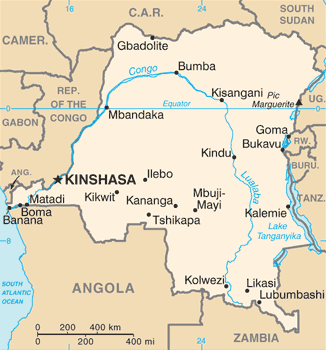
Back العنف الجنسي في جمهورية الكونغو الديمقراطية Arabic Violences sexuelles en république démocratique du Congo French Kejahatan seksual di Republik Demokratik Kongo ID Sexuellt våld i Demokratiska republiken Kongo Swedish

| Part of a series on |
| Violence against women |
|---|
| Killing |
| Sexual assault and rape |
| Disfigurement |
| Other issues |
|
| International legal framework |
| Related topics |
The Democratic Republic of the Congo, and the east of the country in particular, has been described as the "Rape Capital of the World", and the prevalence and intensity of all forms of sexual violence has been described as the worst in the world.[1][2] Human Rights Watch defines sexual violence as "an act of a sexual nature by force, or by threat of force or coercion", and rape as "a form of sexual violence during which the body of a person is invaded, resulting in penetration, however slight, of any part of the body of the victim, with a sexual organ, or of the anal or genital opening of the victim with any object or other part of the body."[3]
The Democratic Republic of the Congo has had a long history of unrest and instability. Although sexual violence has always occurred in the DRC in some capacity, increased rates of sexual violence coincided with the armed conflicts of the early 1990s and later.[4]
Much of the research conducted about sexual violence in the DRC has focused on violence against and rape of women as related to these armed conflicts, mostly occurring in the eastern region of the country.[5] The eastern region of the DRC has the highest rates of sexual violence, and much of it is perpetrated by armed militia groups.[6] However, other studies have begun to show that sexual violence is pervasive in all parts of the DRC and that it is not always related to the conflict.
While there is extensive evidence of the societal and individual ramifications caused by the sexual violence in the country, the government has been criticized for not doing enough to stop it.[4] Although Congolese law criminalizes many forms of sexual violence, these laws are not always enforced.[4]
- ^ "UN official calls DR Congo 'rape capital of the world.'". BBC. 2010-04-28. Retrieved 2012-11-23.
- ^ McCrummen, Stephanie (2007-09-09). "Prevalence of Rape in E. Congo Described as Worst in World". The Washington Post. Retrieved 2009-07-17.
- ^ "Soldiers who rape, commanders who condone". Human Rights Watch. 2009-07-16. Retrieved 2011-08-16.
- ^ a b c Cite error: The named reference
CIAwas invoked but never defined (see the help page). - ^ Cite error: The named reference
Kilonzowas invoked but never defined (see the help page). - ^ Cite error: The named reference
Petermanwas invoked but never defined (see the help page).
© MMXXIII Rich X Search. We shall prevail. All rights reserved. Rich X Search